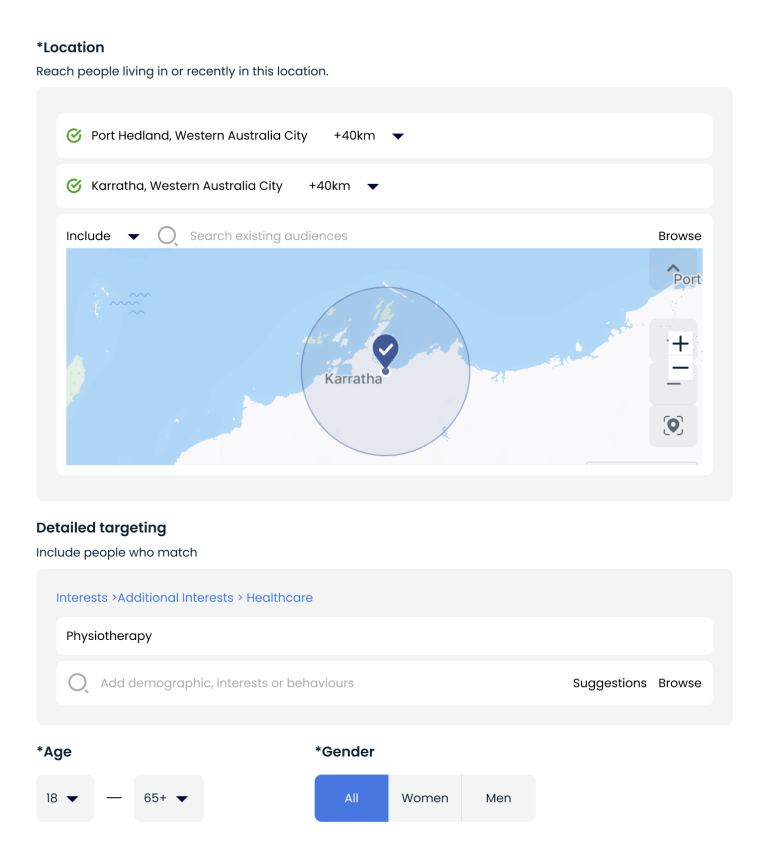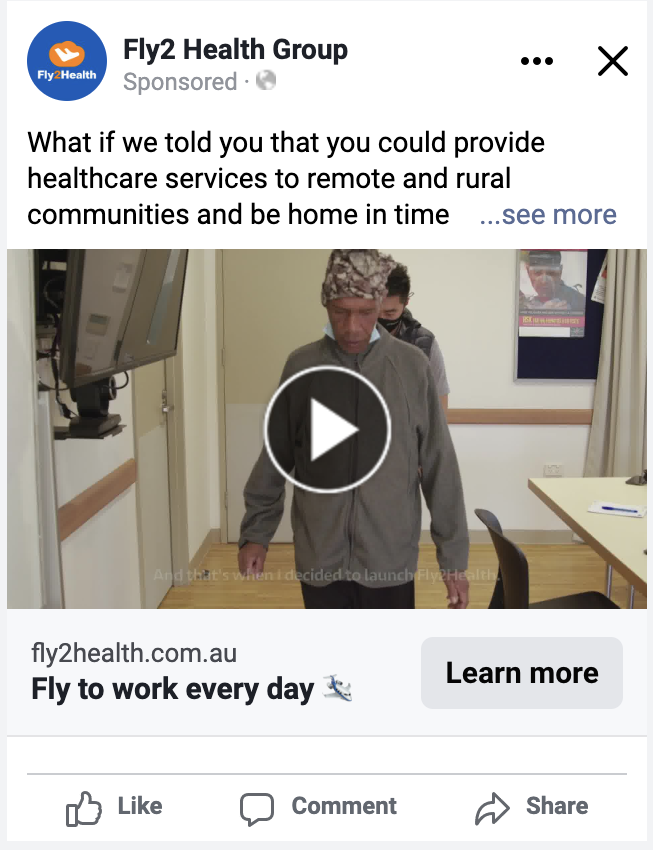Key points on this page:
- Paid social media advertising enables healthcare providers to reach people who match specific patient criteria through campaigns that are optimised for their goals and objectives.
- The best social media ad types are dependent on the campaign goals and stage of the user journey. See our breakdown below.
- It is crucial that your advertising campaigns are compliant with AHPRA and any platform-specific policies.
Summary
As a healthcare provider, if your digital strategy does not include social media advertising, chances are you’re missing out on key clients.
While social media has revolutionised public health communication, it has also created a new set of challenges for healthcare providers.
From AHPRA guidelines to platform-specific advertising policies, the world of ongoing advertising can be complex, but it remains a powerful tool that should be included in your digital arsenal. In this article, we’ll explore the benefits of social media advertising and how you can navigate the maze of online advertising policies to reach new clients.
What are the benefits of social media advertising for healthcare providers?
Brand awareness
The reality is that not everyone will be ready to partake in your healthcare services, but when they are, you want your brand to be the one they think of first.
Not only can healthcare organisations reach beyond the confines of their organic audience to showcase their expertise, services, and products, but social media advertising is the perfect way to share relevant and valuable content to establish yourself as a thought leader in your specialty.
Targeting the right patients
Imagine using customisable targeting parameters to reach highly specific groups of the population whose healthcare needs, interests and online behaviour align with your target market.
By setting specific criteria such as location, interest, age, and other demographic information, social media advertising offers a uniquely powerful way for you to attract patients who may not have been aware of your services before. Social media ads’ ability to reach beyond your immediate following means that you can expand your patient base and attract new patients who could benefit from your services.

A preview of what detailed targeting options can look like in Facebook, with options for different locations and radius, interests, age, and gender.
Better yet, a lookalike audience uses existing customer data to create an audience of similar users who display matching interests and online behaviours. This makes it a powerful tool to reach online users who match your ideal client profile and painlessly attract those who could benefit from your services.
Re-engaging non-converting customers
What if you could reach out to patients who have shown interest in your services but haven’t taken the next step? Retargeting and remarketing can make it happen.
Retargeting involves reaching out to patients who have interacted with the organisation before but have not converted. Remarketing, on the other hand, involves reaching out to patients who have already converted and encouraging them to come back for repeat business.
Platforms like Facebook and Instagram make retargeting and remarketing easy by enabling you to create custom audiences based on previous interactions. This means that providers can specifically target those who have already shown interest in their services, increasing the likelihood of conversion.
The best social media platforms for healthcare advertising
As addictive as TikTok is, Facebook still dominates when it comes to active users, with 2 billion worldwide checking their feeds every month. Not far behind is Instagram, also owned by Meta, with 1 billion monthly active users.
If you’re still not convinced, a 2021 behavioural intent study by WEGO Health assessed the impact of online communities on the distribution of healthcare information and Facebook overwhelmingly emerged as the most popular platform.
87% of participants shared health information via Facebook posts, while 91% revealed that participation in online communities played an active role in their health decisions. This makes Facebook advertising one of if not the most powerful digital advertising channel for healthcare organisations.
Here are the ad types you need to know about
Lead ads
Lead ads collect user information, such as email addresses or phone numbers, directly within the platform with a lead magnet. This is especially effective for organisations looking to grow their email lists or generate new leads.
But remember to strike the perfect balance of qualifying questions: too little and the quality of your leads will suffer, but too many and you may not generate any leads at all because the entry barrier is too high. Our recommendation is 3 to 5.
Video ads
Video ads are fantastic for promoting services in an engaging and visually appealing way. Video ads can be particularly effective for healthcare organisations looking to promote new services or procedures and generate brand awareness to build credibility. We recommend running Facebook, Instagram and LinkedIn video ads for a brand awareness objective.

Video ads can be a great choice for healthcare organisations. Above is an example of a healthcare ad that we’ve run for Fly2 Health.
Retargeting ads are perfect for reaching people who have previously interacted with your website or social media pages. So if you’re looking to re-engage patients who have previously shown their interest, this ad type is for you.
The dos and don’ts of healthcare advertising
Now, you wouldn’t be here if you didn’t know that healthcare advertising in Australia is heavily regulated by the Australian Health Practitioner Regulation Agency (AHPRA).
It is crucial to ensure that all advertising is truthful, accurate, and includes appropriate disclaimers such as risks associated with treatments, qualifications of practitioners, and accreditation of clinics involved. You can find the full list of AHPRA guidelines here.
Meta (Facebook) also has its advertising policies, including using appropriate targeting options, avoiding the use of offensive or inappropriate language or imagery, and refraining from any false or misleading claims. You can find the full list of Meta advertising guidelines here.
If you’d like to find out more on how the team at Dux can help you with social media advertising for healthcare, please get in touch with us on (08) 6119 8461 or by getting in touch with us here.